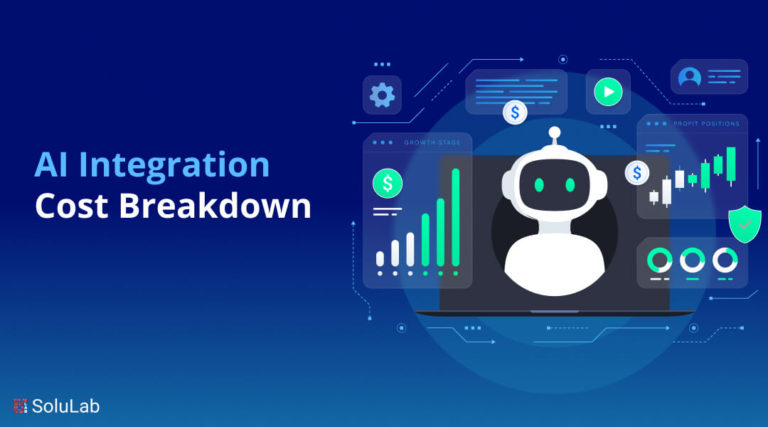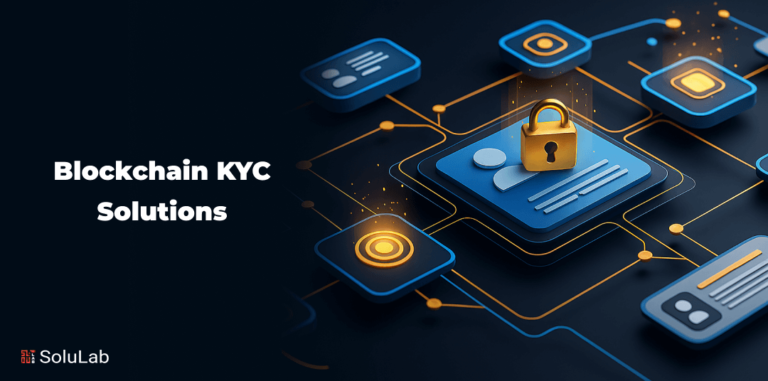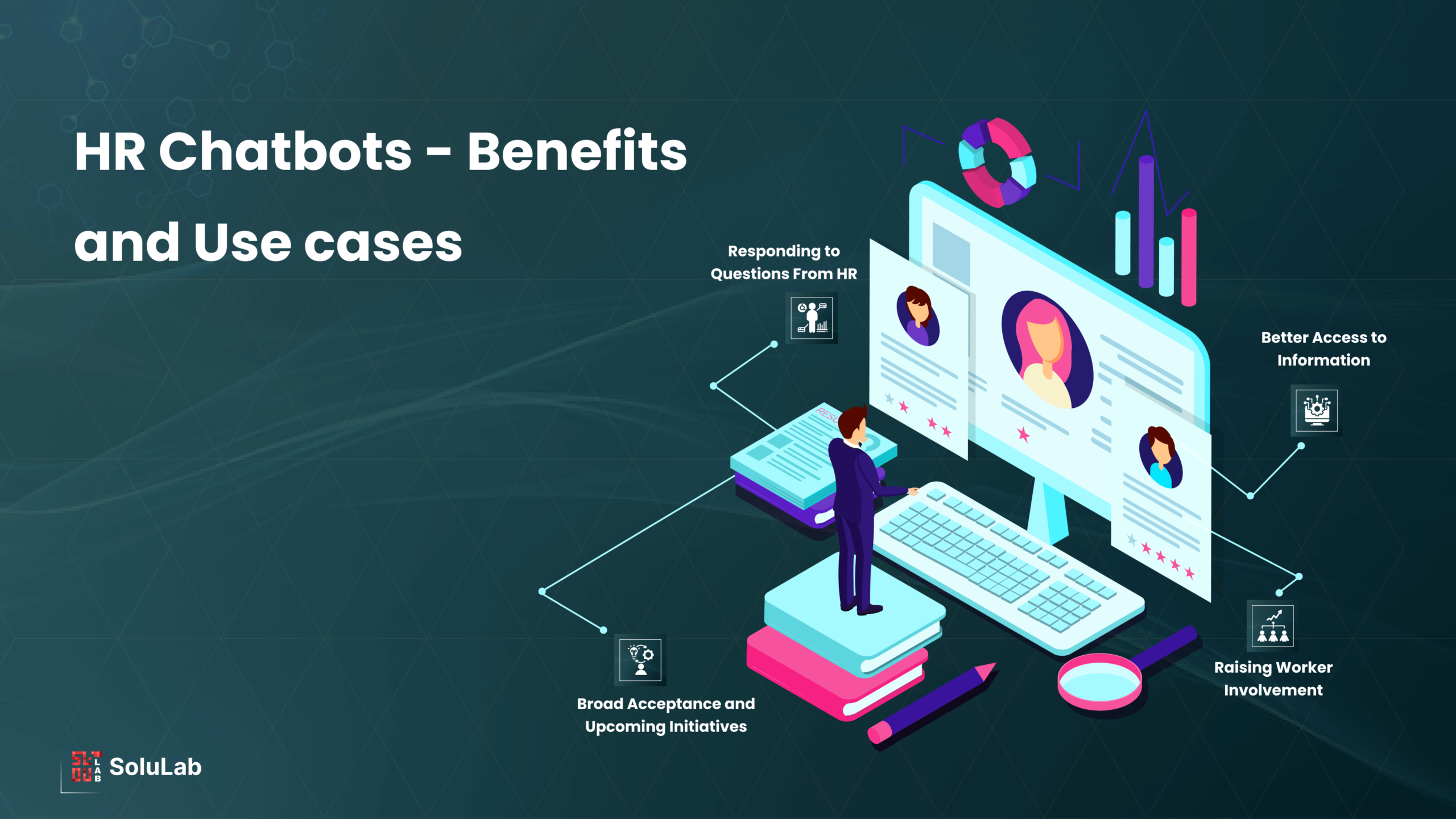
The field of human resource management is being revolutionized by the incorporation of HR chatbots. These modern HR AI chatbots are revolutionizing HR operations by providing ways to improve employee experiences, expedite procedures, and create a more productive workplace. This blog delves into the revolutionary power of AI chatbots in HR, emphasizing their advantages, including enhanced query response, heightened efficiency, and economic viability. We’ll also look at popular HR chatbot use cases like hiring and employee engagement, emphasizing how important these digital assistants are to the changing nature of remote and hybrid work environments.
So, without any further ado, let’s get started!
Overview of HR Chatbots
Imagine working at a company where onboarding goes smoothly, HR questions are promptly resolved, and employee engagement is constantly high. Greetings from the age of HR chatbots, the new digital assistants that are making the field of human resources more responsive, dynamic, and effective.
HR chatbots are becoming more than just automated question-answer systems thanks to artificial intelligence (AI). They can now comprehend, communicate with, and instantly handle HR-related problems. These chatbots are creating better accessibility and user-friendliness in every HR function, from guiding new hires through their first week on the job to answering HR chatbot benefits questions for staff members and expediting the hiring process.
Chatbots in human resources are the link between effective HR administration and a better employee experience at a time when the workforce is becoming more distributed and digital. They’re not only tools; rather, they represent the intelligent, adaptable, and vitally efficient HR of the future.
What is a Chatbot for HR?
A sophisticated conversational AI designed to handle a range of HR-related activities and questions is known as a chatbot for HR. It’s an intelligent system with generative AI and natural language processing (NLP) capabilities, not merely a tool for basic question answering. It can comprehend and react to a wide range of HR inquiries, from leave regulations and employee benefits to more complicated matters like performance reviews, onboarding procedures, and training courses, thanks to these capabilities.
An HR AI chatbot’s primary goal is to automate and expedite time-consuming, repetitive HR operations. By doing this, HR personnel’s burden may be greatly decreased, greatly improving the employee experience, and freeing them up to focus on important and challenging problems.
These HR industry chatbots are an essential component of the contemporary HR toolset since they are skilled at managing self-service portals, running employee surveys, and obtaining feedback.
Because of their versatility, HR chatbots may be implemented into a wide range of platforms, including messaging apps, intranets, corporate websites, and mobile applications. The existence of many platforms guarantees that workers may obtain HR assistance at any time and from any location, promoting a more cohesive and effective work environment.
Top HR Chatbot
Now that you are aware of what is an HR chatbot here is the list of top HR chatbots:
1. Leena AI
By automating all potential HR processes, and procedures and expediting employee requests, Leena.AI, enables chat and seeks to listen to the load of daily tasks of the HR team. Based on organizational needs, it enables businesses to customize staff workflows. This HR chatbot has natural language comprehension capabilities that enable it to automatically answer your employees’ questions and concerns, enabling them to submit tickets any time they require assistance and streamline HR procedures.
Features
- Natural Language Comprehension for inquiries
- A ticketing system for staff assistance
- Individualized work processes for employees
- Simplifying HR procedures and activities
- Efficient management of HR tasks, and workflow
2. Rezolve.AI
Rezolve.AI is a modern HR help that integrates with MS teams and provides workers with automated and customized HR assistance with the help of Generative AI HR chatbot sidekick. Employees can communicate with this HR chatbot any time they run into issues. By developing a customized solution, this interactive Help chatbot will promptly attract the employees’ questions and concerns. In addition to saving time, this will make the employee experience smooth and easy for HR assistance representatives.
Features
- Real-time HR assistance via Gen AI sidekick Chabot
- Knowledge management through conversation that delivers accurate information at any time and from any location
- Live chat with a human in the loop for L2 support
- A new tool for employee engagement service together in input.
- A no-code automation solution to simplify intricate HR procedures and activities
- Accessible chain management with MS teams
3. Paradox.AI
Olivia is an HR chatbot that Paradox provides. Its purpose is to make applying for jobs easier. It makes it easy for applicants to apply by text message on this smartphone. It may check applications for employment criteria and enable video discussions with them via a straightforward link. With direct integration and public API, Olivia may also independently arrange interviews and integrate with a variety of devices, apps, and systems.
Features
- Texting to apply for a job
- Interviews on videos
- Screening of candidates
- Scheduling of interview interviews
- Combinations
4. Ideal
Ideal provides a hiring chatbot that effectively evaluates applications, increases candidate engagement, and does away with the need for lengthy phone screening. It can implement chatbot questionnaires via emails and instant messages and expedite that pre-screening procedure around the clock. Around 70% of exchanges can be effectively automated by the chatbot.
Features
- Increasing the involvement of candidates
- Pre-screenings
- Giving top prospects priority
- Qualifications of candidates
- Distributing questionnaires chatbots
5. Humanly
A program called Humanly may automate communication with applications via websites, text, email, and career sites. It ensures that applicant profiles are kept up-to-date and uses objective questioning to gain insight into the background and skill set of the candidate. Humanly seeks applicants who can enhance the culture of your company.
Features
- Responding to inquiries about candidates
- Scheduling and screening
- Engagement of candidates
- Evaluating the backgrounds and abilities of applicants
- Keeping candidate profiles, currently maintained
What Benefits Can HR Chatbots Offer?
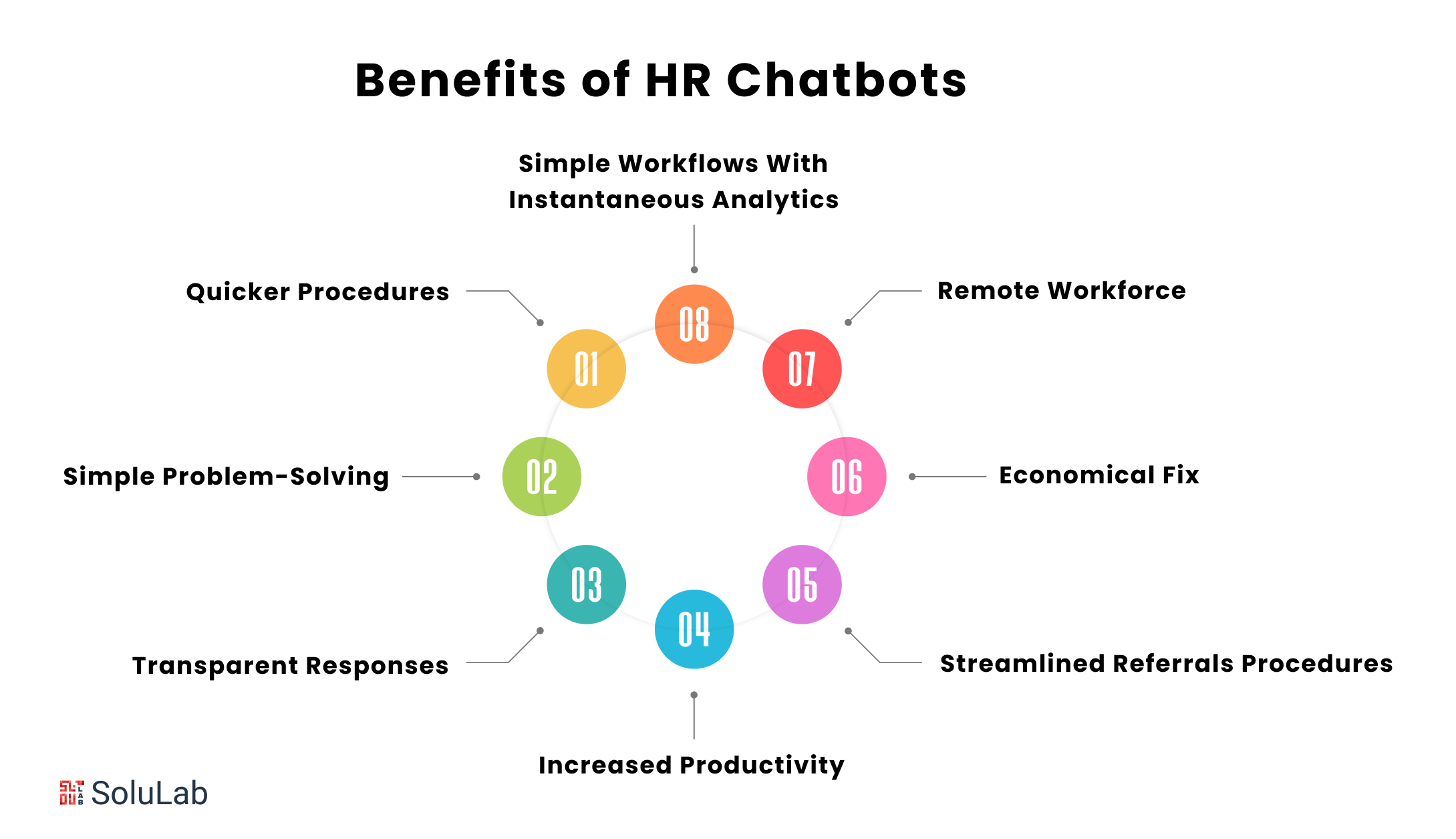
The efficacy and efficiency of human resource departments across companies are being redefined by the incorporation of HR chatbots.
The following are the primary benefits of chatbot in HR:
-
Quicker Procedures
HR department workflow is being revolutionized by HR chatbots. They are particularly good at hiring, onboarding, and managing leaves. They also excel at automating and streamlining other time-consuming operations. For instance, a chatbot can now precisely classify applications in hours instead of the days it used to take. This acceleration improves the overall effectiveness of HR operations by streamlining HR activities and drastically cutting the hiring time.
The second acceleration layer stems from their capacity to promptly address regular staff queries. This instantaneity is essential in hectic work settings where staff morale and productivity can be directly impacted by the prompt availability of information.
-
Simple Problem-Solving
Chatbots are a game-changing option for an HR department overrun with repeated queries. With their sophisticated natural language processing (NLP) skills, they can comprehend and instantly address a variety of employee inquiries. It guarantees that whenever workers want information on HR rules, perks, and processes, they will always get consistent and correct information.
Furthermore, HR chatbots free up real HR specialists to concentrate on more important and difficult problems by answering these repetitive questions. It not only makes the best utilization of a human resource chatbot but also raises employee satisfaction by guaranteeing that their issues are handled effectively and on time.
-
Transparent Responses
Chatbots in HR give employee interactions a never-before-seen degree of openness. Because their replies are based on facts, the information they offer is accurate and consistent. It is particularly important in delicate areas where fairness and clarity are critical, such as policy explanations or grievance redressals.
Furthermore, the impartiality of chatbots promotes confidence among staff members. Employees feel free to voice concerns or ask questions because they know they will get frank, unbiased answers, which fosters an honest and open work environment.
-
Increased Productivity
chatbot for HR greatly increases productivity both inside the HR division and throughout the whole company. They provide HR professionals more time by automating repetitive operations, allowing them to focus on more important duties like talent development and strategic planning. The organizational HR function is elevated by this transition from transactional to strategic activity.
Chatbots provide employees with instant access to HR information and assistance, which minimizes downtime and increases job satisfaction. Overall organizational productivity rises as a result of employees spending more time on their primary duties and less time navigating HR procedures.
-
Streamlined Referrals Procedures
The employee recommendation process is made easier, more engaging, and more efficient by HR industry chatbots. To expedite the recommendation submission process, they might proactively inform staff members about available openings and provide an invitation to recommend qualified people. It expedites the hiring process and makes greater use of the current staff by drawing from a larger pool of talent.
Furthermore, chatbots are capable of managing and tracking referrals, and giving staff members information on the progress of their recommendations. This openness promotes a culture of cooperation and teamwork and motivates participants in the referral program to continue participating.
-
Economical Fix
For businesses, implementing a chatbot for HR is an affordable solution. These virtual assistants take care of a wide range of duties that would normally need substantial human resources. Chatbots provide significant cost savings in terms of salary, training, and other associated expenditures by eliminating the need for a sizable HR personnel to handle regular questions and tasks.
Furthermore, because chatbots are scalable, expanding firms may easily use them as cost-effective solutions to handle growing workloads. Their capacity to update and adjust to evolving HR rules and regulations guarantees that businesses stay compliant without having to pay additional fees.
-
Remote Workforce
In the current world of remote and hybrid work patterns, chatbots for HR are essential for facilitating communication over physical distances. They provide remote workers with round-the-clock assistance, responding to their questions and issues instantly, no matter where they are. This continuous accessibility guarantees that distant workers stay connected and get assistance, improving their productivity and quality of work life.
Additionally, recruiting chatbots in the HR industry simplifies remote onboarding and training procedures by giving recruits quick access to the data and tools they need. Despite their physical distance, it makes it easier for them to integrate into the company and contributes to the development of a cohesive and knowledgeable remote workforce.
-
Simple Workflows With Instantaneous Analytics
HR chatbots use real-time analytics to not only automate procedures but also deliver insightful information. HR departments may gain valuable insights into employee requirements and trends by using them to log interactions and collect data on employee questions and complaints. Chatbots for HR services and policies may be continuously improved thanks to this data-driven approach.
Additionally, these insights are essential for making strategic decisions. HR teams may improve employee happiness and retention by better tailoring their programs and efforts to the requirements of the workforce by studying employee habits and preferences.
What are the Top Use Cases of Chatbots in the HR Industry?
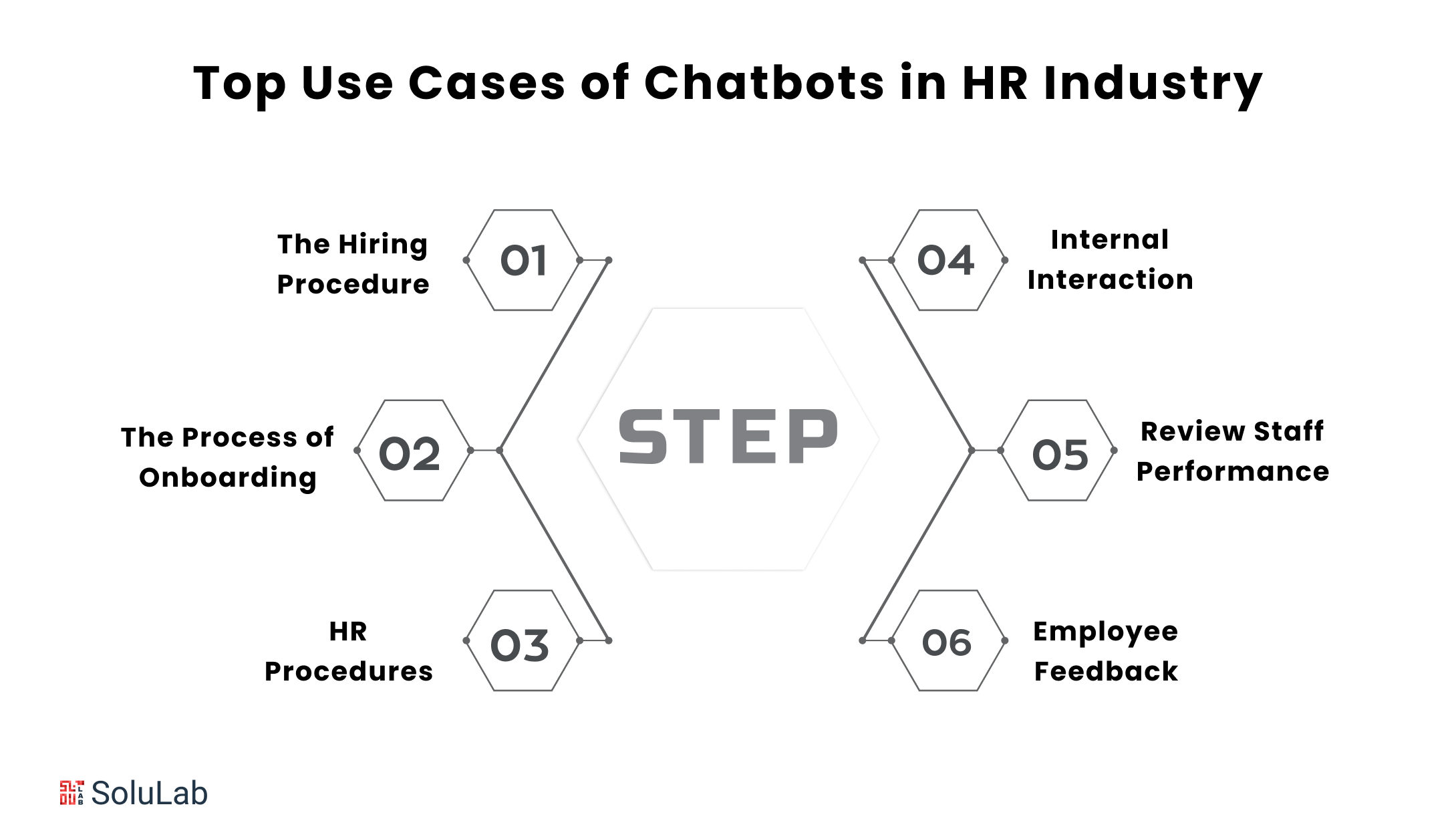
The introduction of HR chatbots is revolutionizing the ever-changing field of human resources. In labor management, these AI-driven solutions are generating new paradigms. HR chatbots are showing themselves to be quite useful tools, from automating repetitive work to offering strategic insights. Let’s examine six crucial areas where chatbots for HR are having a big influence:
1. Using Knowledge Bot for Inquiries
Use a knowledge bot to assist staff in finding information on their own. Your co-workers may ask a range of simple questions that require prompt action. These inquiries relate to subjects. Three subjects that frequently prompt employees to ask questions, you can use knowledge, but instead of making some employees repeatedly answer the same question or having them go through the library of resources. Each time they need assistance.
The knowledge bot operates as follows:
- Employees may access the knowledge board on their company chat platform if they have a query or concern.
- The employee then chooses to enter the category issue and include any relevant information under the search term.
- After the worker selects apply filters, the bot instantly looks through all of the information and all of your company’s knowledge bases.
- The member can then access the article page by clicking on the links provided.
2. Welcome Bot for Easy Onboarding
Upon joining your company, a new hire will probably require assistance in determining which channels to join inside the messaging platform. This is especially relevant if they work remotely. The messaging app can be their one-stop shop for finding important information about the profession and connecting with co-workers.
Informing the newcomers about their first day can relieve the burden on your hiring managers in the HR department. It shares channels relevant to their field of expertise, provides extra avenues for the new hire to be informed about various company facts, and provides. A welcome-bot Slack message is sent on a new hire’s first day to further assist with the onboarding of the new hire by sharing a message that reminds the new employee to give a brief introduction to the business and explains important contacts at the company to the new hire.
3. Sending Birthday Wishes
You have few alternatives for your employee’s birthdays when they work remotely. However, you may still use a Birthday bot to acknowledge their special day and try to make it much better. The HR chatbot will notify you if a team member’s birthday is coming up, giving you time to compose a curated message or wish them well in advance.
All of the team’s greetings are collected by Birthday and sent straight to the employee on their birthday. A birthday bought Slack message, requesting that I send in a birthday greeting for a coworker.
4. Recruiter Bot for Hiring Process
Employees gain more than just advantages when they are permitted to recommend friends and co-workers. References from employees are more likely to perform better and remain with the company for a longer period.
You can use a bot to encourage staff members to provide referrals. By offering a model in the company communication platform that has all of the necessary recommendation fees from your applicant tracking system, the HR chatbot enables staff members to make referrals. After the candidate has completed and submitted the form, add them to your ATS.
5. Standup Bot for Great Teamwork
Use the standup bot to communicate with members of your team and learn about the project. It’s easy to feel cut off from your team members and their jobs, especially since many of them probably work remotely. By employing a stand-up bot, you can listen to this emotion and foster greater teamwork.
This is how it will function:
- Every morning, the bot poses a predetermined series of questions to every team member: how are you feeling this morning and what are your top three priorities for today as well are there any obstacles or inquiries?
Stand-up bot shares your response in your team’s channel on your corporate communications platform after you submit them. This way, everyone in your team can see how you are doing and what you’re working on, and then they can react appropriately.
HR Chatbot Statistics
Conversational AI systems are undoubtedly transforming hiring and personal management procedures. They are more successful and efficient because of this technology. The following significant figures demonstrate the growing impact of using chatbots in HR:
- Virtual assistance and machine learning applications have already been implemented by 13% of the teams.
- According to Gartner, AI-based conversational platforms or bots will handle 75% of the queries.
- Around 92% of departments in HR, acknowledge the usefulness of boards in helping staff members find the information they require.
- 73% of candidates were unable to discover whether they were speaking with a bot since the AI product’s user interface is so smooth.
- A career website that uses the chatbot to interact with Job search reports, a notable increase in results, such as 40% of completed application applications, 95% more leads, and 13% greater clicking on job requests.
The Future of HR Chatbots
1. The trend of HR is increasing the concentrated or employee well-being in the future:
2. Organizations should expand HR benefits to include mental health, work, life, balance, and wellness programs.
3. Companies invest more in supporting settings that promote professional progress and well-being since the workforce is a crucial asset.
4. Chatbot integration will change HR. This text will improve HR productivity by improving recruitment.
5. Immersive learning with augmented reality and virtual reality can change training programs.
These trends indicate a change towards a more people-centric, technologically adept, and forward approach to HR chatbots.
Concluding Remarks
In conclusion, the journey towards revolution of human resources (HR) chatbots requires a proactive and adaptive mindset. As we anticipate the future of HR, it is evident that the focus will remain steadfast on employee well-being and the seamless integration of emerging technologies.
Companies like SoluLab stand at the forefront of transforming the HR industry. Through our AI development services, we empower organizations to harness the potential of artificial intelligence in reshaping HR processes. By leveraging renowned AI solutions, SoluLab enables companies to streamline recruitment, enhance employee engagement, and make data-driven decisions. SoluLab, an AI development company, emerges as a key partner in unlocking the transformative power of AI in the realm of Human Resources.
FAQs
1. What is an HR chatbot?
Artificial intelligence (AI) powered virtual assistants known as HR Chatbots assist with human resource duties. They can perform actions, automate repetitive operations, and respond to inquiries from candidates and employees.
2. How are chatbots used in recruiting?
By automating first-contact interactions with candidates and responding to commonly asked questions regarding job openings and the organization, pre-screening candidates based on their skills, setting up interviews, and generally expediting the hiring process by offering convenient communication.
3. Which is the chatbot for HR-related queries?
“Leena AI” is a comprehensive AI assistant that can handle a variety of HR tasks, including performance management, employee management, and information access via a conversational interface.
4. Why is there a growing emphasis on employee well-being in HR practices?
In today’s workplace, work-life balance, psychological wellness, and stress management are becoming more important because healthy and happy employees boost productivity, retention, engagement, and the company’s bottom line.
5. How to build a recruitment chatbot?
For building a recruitment chatbot you will have to identify the type of chatbot that you need, then move ahead with designing a conversational job application, integrate management tools within the bot, add conditions, and lastly set automated schedules for interviews.
6. Are chatbots useful for human resource management?
Chatbots can automate repetitive tasks like responding to commonly asked questions about policies, benefits, and leave which freezes up HR professionals to work on more strategic projects. They can also improve staff members‘ access to information and streamline processes like hiring and boarding.
7. What is the name of the digital HR chatbot?
EVA is a well-known digital HR chatbot developed by Leena AI. It is an AI-powered board that aims to improve the experience of employees by answering HR-related questions.




